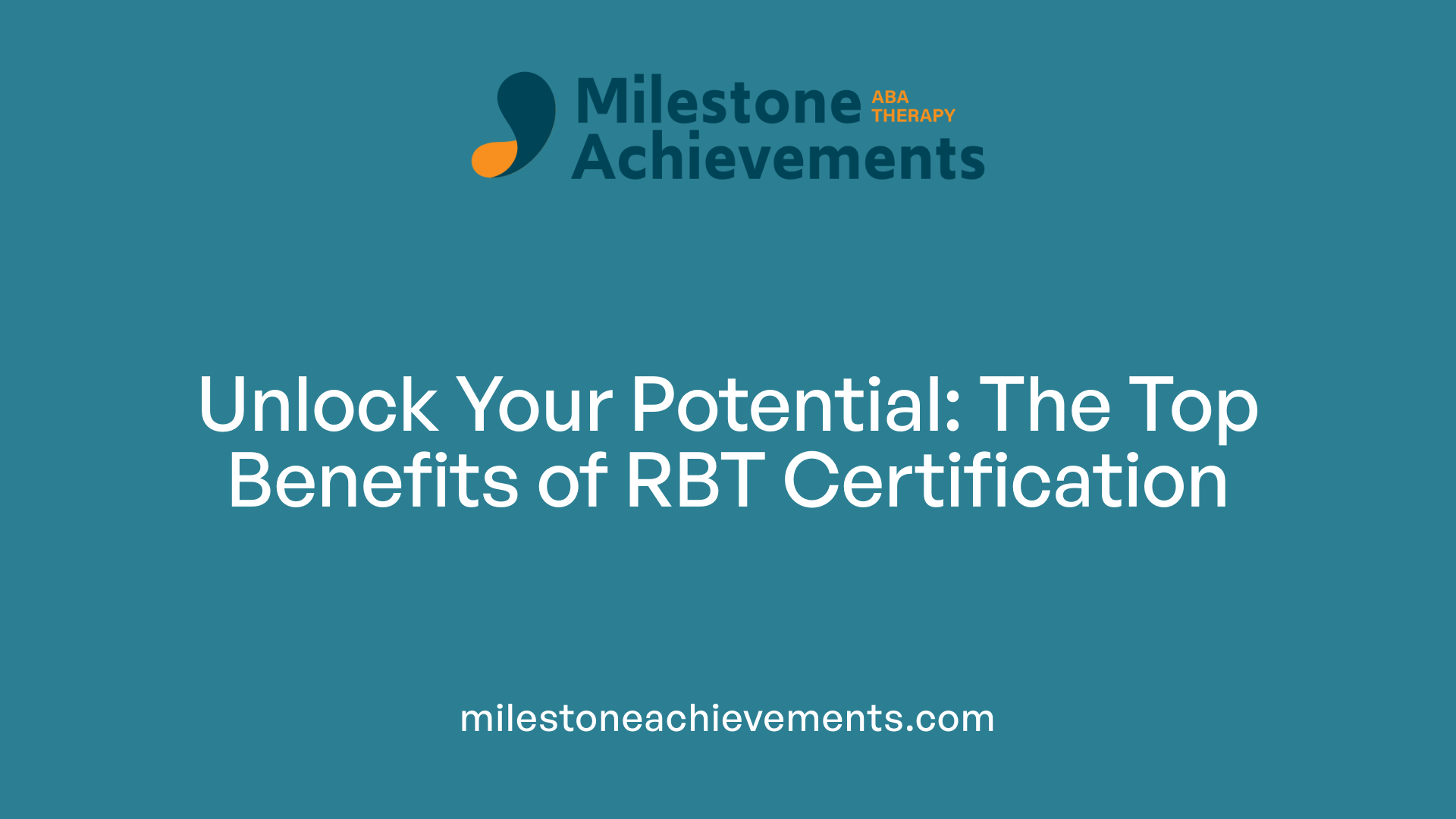
Is RBT Certification Worth It?
Unlocking Opportunities with RBT Certification in Behavior Analysis
Introduction to RBT Certification and Its Impact
In recent years, the demand for skilled behavior technicians has surged, making the Registered Behavior Technician (RBT) credential an increasingly valuable asset in the field of applied behavior analysis (ABA). This article explores whether obtaining RBT certification is a worthwhile investment by examining its relevance, benefits, certification process, career prospects, and how it compares to advanced credentials like BCBA and BCaBA.
The Relevance of RBT Certification in Behavior Analysis
How relevant is RBT certification in the field of behavior analysis?
RBT (Registered Behavior Technician) certification holds significant importance in the behavior analysis profession. It signifies that an individual has successfully completed the required training and demonstrated core skills necessary to support ABA (Applied Behavior Analysis) interventions under supervision.
This credential, recognized by the Behavior Analyst Certification Board (BACB), enhances job prospects across various environments such as schools, clinics, hospitals, and community settings. It not only serves as a validation of professional competence but also acts as a stepping stone for those aiming to pursue advanced roles like BCBA (Board Certified Behavior Analyst).
The certification process involves comprehensive training, including 40 hours of coursework, and assessments that focus on ethics, client interaction, and intervention strategies. This structure helps ensure a high standard of service quality and professionalism among certified RBTs.
Having an RBT certification also opens doors for career advancement and specialization within the field of behavior analysis. It provides a foundation for ongoing education and the possibility to attain higher certifications, which can lead to higher salaries and more responsible positions.
While some critics question the sufficiency of training and the empirical evidence supporting certain interventions, the RBT credential remains an essential credential for paraprofessionals working directly with clients, especially in supporting individuals with autism and developmental disabilities.
In summary, RBT certification is highly relevant—it validates essential skills, supports career growth, and helps uphold adequate service standards in the growing field of behavior analysis.
| Aspect | Details | Explanation |
|---|---|---|
| Relevance | High | Recognized by BACB, essential for paraprofessional roles |
| Career Impact | Significant | Opening pathways for advancement and specialization |
| Training | 40 hours + assessments | Ensures foundational competence and adherence to ethics |
| Settings | Diverse environments | Schools, clinics, hospitals, community |
| Future Opportunities | Continuous education | Pathway to BCBA and higher certifications |
Benefits of Obtaining RBT Certification

What are the benefits of obtaining RBT certification?
Earning the Registered Behavior Technician (RBT) credential provides a range of important advantages for individuals interested in the field of applied behavior analysis (ABA). One primary benefit is enhanced professional credibility. Certification signals a commitment to ethical standards and best practices, helping RBTs gain trust from clients, families, and employers.
This credential also opens up more job opportunities. RBTs are in high demand across various settings, including schools, clinics, homes, and community programs. Many organizations prioritize hiring certified professionals, making it easier to find stable employment.
Pathways for career growth are readily available to RBTs. Certification serves as a stepping stone toward advanced roles like Behavior Analyst (BCBA or BCaBA). With experience, RBTs can pursue further education and certifications, often resulting in higher salaries and increased responsibilities.
The recognition of the RBT credential extends beyond the U.S. borders. It is acknowledged across regions, including Canada, facilitating employment mobility and the ability to work in different states or countries.
Finally, being an RBT allows practitioners to have a profound impact on their clients' lives. Working directly with individuals with developmental disabilities, especially autism, provides a rewarding experience. Ongoing training and professional development help RBTs stay current with evidence-based strategies, improving client outcomes.
| Benefits | Description | Additional Details |
|---|---|---|
| Professional Credibility | Builds trust and demonstrates ethical practice | Recognized nationally and internationally |
| Increased Job Opportunities | Widely accepted in diverse environments | Clinics, schools, homes, community settings |
| Career Pathways | Stepping stone to becoming a BCBA or other advanced roles | Higher salaries and leadership roles |
| Regional Recognition | Credentials accepted across different regions and countries | Facilitates employment mobility |
| Positive Client Impact | Directly helping individuals improve their skills and independence | Highly rewarding career |
Acquiring an RBT certification can serve as a foundation for a fulfilling and sustainable career in behavioral health, while making a meaningful difference in the lives of many.
Is RBT Certification a Strategic Investment?

How does RBT certification support career advancement?
Obtaining an RBT (Registered Behavior Technician) certification serves as an excellent foundation in the field of behavior analysis. It equips individuals with essential skills necessary for working directly with clients, especially children with developmental disabilities like autism.
The certification not only enhances credibility but also broadens employment opportunities in settings such as schools, clinics, homes, and community environments. These roles often require or favor certified professionals, making certification a valuable asset.
Furthermore, an RBT acts as a stepping stone to more advanced credentials like BCBA (Board Certified Behavior Analyst) or BCaBA (Board Certified Assistant Behavior Analyst). These higher certifications allow for greater responsibilities, leadership roles, and significantly higher earnings.
What about job stability and demand?
The demand for RBTs is increasing rapidly, driven by heightened awareness and diagnosis of autism spectrum disorder and other developmental conditions. The BACB reports a projected growth rate of about 9% for RBT roles from 2021 to 2031. This high demand ensures good job stability and ongoing employment opportunities.
This vital need for qualified behavior technicians means that career prospects are not only promising but also resilient against economic fluctuations.
How much can RBTs earn, and how does this vary?
The average hourly wage for RBTs in the United States stands at approximately $27.24 as of November 2024. Entry-level positions typically start around $20 per hour, equating to roughly $41,600 annually.
With experience, salaries tend to increase, with qualified RBTs earning around $25 per hour, translating to roughly $52,000 per year. Wages can range from about $14 to over $43 per hour depending on location, work setting, and experience.
Work environments such as hospitals, clinics, and schools often offer better pay and benefits, further enhancing the earning potential.
Is investing in RBT certification worth it?
Yes, pursuing RBT certification is a strategic decision for those passionate about helping others and interested in a career rooted in evidence-based practices. It provides immediate job opportunities, a strong professional foundation, and the potential to advance in the growing field of applied behavior analysis.
Overall, earning an RBT credential offers a meaningful career that combines personal fulfillment with financial stability and opportunities for continuous professional development.
The Path to RBT Certification: Step-by-Step Guide
What is the process to become a registered behavior technician (RBT)?
Becoming an RBT involves several clear steps. Firstly, candidates need to create an account with the Behavior Analysis Certification Board (BACB). They must then complete a 40-hour training course that aligns with the RBT Task List (2nd edition). This training can be taken online through approved providers like UTSA's PaCE program, which emphasizes affordability and quick completion.
Once the training is finished, candidates are required to upload proof of completion along with other necessary documents. The next step is to undergo a competency assessment, which must be overseen by a BACB certificant. This practical evaluation demonstrates the candidate’s ability to apply behavioral techniques effectively.
After passing the competency assessment, applicants can submit their application to BACB, including all proof and documentation. The final step is to schedule and pass the certification exam, consisting of 85 multiple-choice questions. This exam tests knowledge in areas like measurement, assessment, ethics, and intervention strategies.
Upon successful completion of the exam, individuals earn the RBT credential. Maintaining certification requires ongoing supervision, ethical practice, and periodic renewal, including continuing education and competency assessments to ensure skills remain up to date.
Comparing RBT with BCBA and BCaBA Certifications

Educational requirements
The RBT certification requires at least a high school diploma or equivalent, along with completing a 40-hour training program based on the RBT Task List. Once the coursework is completed, candidates must pass a competency assessment and a certification exam.
In comparison, a BCaBA (Board Certified Assistant Behavior Analyst) needs a bachelor’s degree in behavior analysis, psychology, or related fields, along with specific coursework and supervised practical experience. The BCBA (Board Certified Behavior Analyst), the most advanced of the three, requires a master's degree in behavior analysis or a related field, plus additional coursework and supervised fieldwork.
Scope of practice
RBTs work directly with clients, implementing behavior plans designed and overseen by BCBAs or BCaBAs. They provide hands-on services, such as teaching skills and data collection.
BCaBAs can assist BCBAs in developing programs, conducting assessments, and supervising RBTs under oversight. BCBAs have the authority to independently develop, oversee, and evaluate behavior intervention strategies, and are responsible for the overarching management of client programs.
Supervision and responsibilities
An RBT works under direct supervision of a BCBA or BCaBA. They implement intervention plans, monitor client progress, and document outcomes.
BCaBAs, while able to supervise RBTs, do so under the general supervision of a BCBA. BCBAs carry the responsibility for designing treatment plans, conducting functional assessments, and ensuring compliance with ethical standards.
Career pathways and responsibilities
Starting as an RBT offers a foundation in applied behavior analysis with opportunities to gain practical experience working with clients. It can serve as a stepping stone toward higher credentials like BCaBA and BCBA.
Advancement to a BCaBA or BCBA expands your scope of practice, involving greater responsibilities such as program development, staff training, and conducting assessments. These roles typically come with higher salaries, often exceeding $80,000 annually for BCBAs.
| Certification | Education Level | Primary Role | Supervision Level | Typical Salary Range |
|---|---|---|---|---|
| RBT | High School/Education equivalent | Direct client services | Supervised by BCBA/BCaBA | $13.94 - $43.27/hour |
| BCaBA | Bachelor’s degree | Assist in program implementation, support BCBAs | Supervised by BCBA | Often near or above $50,000 annually |
| BCBA | Master’s degree | Develop, oversee and evaluate behavior programs | Independently | Usually over $80,000 annually |
Understanding these differences can help individuals choose the right path based on their educational background, career ambitions, and current responsibilities within the field of behavior analysis.
Career Pathways and Salary Projections for RBTs
What are the career opportunities and salary prospects for RBT-certified professionals?
Registered Behavior Technicians (RBTs) play a vital role in supporting individuals with developmental disabilities, especially autism. Their primary responsibilities include teaching replacement behaviors, improving communication skills, and helping clients develop adaptive living and self-help skills. They work closely with clients, families, and BCBAs (Board Certified Behavior Analysts) to implement evidence-based strategies.
The career opportunities for RBTs are expanding due to the increasing recognition of behavioral interventions for autism and other developmental disorders. Most RBTs begin their careers in roles like behavior technician or ABA (Applied Behavior Analysis) therapist. These jobs are in high demand, with projected job growth at around 12% to 22% over the next decade.
Salaries for RBTs vary significantly based on factors such as geographic location, level of experience, and additional certifications. According to recent reports, the national average hourly wage is approximately $27.24, translating into an annual salary of about $56,700 for full-time workers, assuming a 40-hour workweek.
In terms of salary range, most RBTs earn between $20.43 and $33.41 per hour. Entry-level positions typically start at around $20 per hour, or roughly $41,600 annually. With experience and specialization, RBTs can earn about $25 per hour, equaling roughly $52,000 annually. The highest-paying regions, such as Hawaii, New York, California, and Massachusetts, offer salaries exceeding $50,000, with top earners reaching approximately $141,000 in some cases.
How can RBTs advance in their careers?
Advancement opportunities for RBTs include obtaining additional certifications like BCaBA (Board Certified Assistant Behavior Analyst) or BCBA (Board Certified Behavior Analyst). These credentials require further education, supervised experience, and passing more comprehensive exams.
Earning a BCBA, a graduate-level credential, can lead to higher salaries exceeding $80,000 annually. These roles involve designing treatment plans and overseeing RBTs, thereby increasing earning potential and professional responsibility.
Overall, the career outlook for RBTs is promising. The combination of increasing demand, the potential for higher earnings through further education, and the rewarding nature of helping others makes this a compelling field for those interested in behavioral health.
Additional Benefits and Real-World Impact of RBTs
What makes the role of an RBT fulfilling and impactful?
The work of a Registered Behavior Technician (RBT) is deeply rewarding because it involves directly supporting individuals, mainly children with autism and other developmental disabilities. RBTs help clients acquire essential skills, such as communication, self-help, and social behaviors, which significantly boost their independence and quality of life.
Building strong, trusting relationships with clients and their families adds a personal and fulfilling dimension to the job. Many RBTs find satisfaction in seeing tangible improvements and progress as a result of their interventions.
The work environment for RBTs is varied and flexible. They may work in settings like schools, clinics, homes, or community centers. This diversity provides opportunities to experience different challenges and adapt skills accordingly.
Holding an RBT certification also enhances professional recognition. It demonstrates a commitment to evidence-based practice and establishes credibility within the field of applied behavior analysis (ABA). This credential supports career growth and affirms the value of their work.
Overall, the role combines meaningful client impact with professional respect and personal satisfaction. RBTs play a vital part in helping individuals reach their potential, which many describe as one of the most rewarding aspects of their careers.
Ongoing Professional Development and Credential Maintenance

What are the ongoing requirements to maintain RBT certification?
Maintaining an RBT credential involves a commitment to continuous learning and adherence to professional standards set by the BACB. Certified RBTs must complete a 40-hour training renewal each year, ensuring their knowledge stays current with the latest practices and ethical guidelines.
Besides training, RBTs are required to undergo an annual competency assessment conducted by a BACB-certified supervisor. This assessment confirms that the RBT continues to meet the competency standards necessary for effective client services.
Adherence to the BACB code of ethics is also mandatory. This encompasses maintaining confidentiality, providing services within the scope of practice, and acting ethically in all professional interactions. RBTs must report their ongoing activities, including supervision hours and professional development, to uphold certification standards.
The renewal process involves submitting documentation that proves completion of required coursework, competency assessments, and supervision activities. Certification fees must be paid annually, and the process must be repeated each year to ensure credentials remain valid.
By fulfilling these requirements, RBTs demonstrate their dedication to professional growth and quality service, reinforcing their credibility and importance within the field of applied behavior analysis.
Conclusion: The Value of RBT Certification in Your Career

What are the main benefits of becoming an RBT?
Becoming a Registered Behavior Technician (RBT) offers many advantages for those interested in the field of behavioral health. The certification process, which includes 40 hours of training, a competency assessment, and passing a certification exam, is designed to be accessible and straightforward. Once certified, RBTs are recognized across the industry, which boosts their credibility and marketability.
The role itself is highly rewarding. RBTs work directly with children and adults with developmental disabilities, including autism. They teach essential skills such as communication, self-help, and adaptive living skills. Building meaningful relationships with clients and families makes this work both fulfilling and impactful.
How does certification impact professional growth?
The demand for RBTs is high, driven by a shortage of qualified professionals and increasing recognition of behavioral interventions' effectiveness. This demand translates into solid job stability and growth opportunities. As RBTs gain experience, their earning potential increases, with starting wages around $20 per hour. With experience, many earn approximately $25 per hour, and some can make up to $43 or more.
Further career advancement is achievable by pursuing higher credentials such as the Board Certified Behavior Analyst (BCBA). BCBAs typically earn over $80,000 annually and oversee behavior analysis programs. Additionally, working as an RBT can be a stepping stone toward advanced roles, expanding one’s professional scope within behavioral health.
What is the financial outlook for RBTs?
Average hourly pay for RBTs in the United States as of late 2024 is about $27.24. Wages vary depending on location, work setting, and experience. For example, entry-level RBTs working in clinics or schools may start at around $20 per hour, while those with more experience or working in specialized settings can earn significantly more.
Potential earnings can reach over $66 per hour in some cases, especially with additional certifications or specialization. Regularly updating skills and credentials not only increases earning potential but also improves job security.
Are there long-term benefits to investing in RBT certification?
Absolutely. The RBT credential is nationally recognized and required by the Behavior Analyst Certification Board (BACB). It demonstrates a dedication to evidence-based practice and professional standards. Employers favor certified RBTs, which enhances job prospects.
Furthermore, ongoing requirements, such as continuing education and annual competency assessments, ensure that RBTs stay current with industry best practices. This commitment supports continued professional development and can lead to higher positions within organizations.
Final thoughts: Is RBT certification a worthwhile investment?
In conclusion, RBT certification is a valuable career investment. It opens doors to meaningful work helping individuals with developmental needs while providing a stable income stream. The certification process is designed for accessibility and affordability, making entry into the field achievable for many.
The growth in demand for RBTs guarantees job reliability. Combined with the earning potential and opportunities for advancement, pursuing this credential can significantly elevate your career in behavioral health.
For those passionate about making a difference through evidence-based interventions, obtaining an RBT certification is a strategic and rewarding choice. It blends personal fulfillment with professional and financial growth, making it a sound investment for your future.
Final Take: Is Pursuing RBT Certification the Right Choice?
Considering the growth in demand, salary prospects, and potential for career advancement, obtaining RBT certification emerges as a strategic choice for individuals passionate about behavioral health and making a difference. The certification not only opens doors to immediate employment opportunities but also serves as a stepping stone to higher-level roles such as BCBA, which offer increased responsibility and earnings. With comprehensive training, a clear pathway for certification, and ongoing professional development requirements, the RBT credential stands as a valuable asset for building a sustainable and fulfilling career in behavior analysis. Therefore, if you are motivated to contribute positively to the lives of others and seek stable employment with growth potential, investing in RBT certification is a decision worth considering.
References
- How much does an RBT make? Salary, hourly, benefits...
- Is registered behavior technician a good career?
- How to Become a Registered Behavior Technician (RBT) in Texas
- Is BCBA Certification Worth the Investment? - Move Up ABA
- Is an RBT certification worth it? - Zippia
- RBT Certification | Registered Behavior Technicians | Free Guide
- ABA Certification Explained: RBT, BCaBA, BCBA, BCBA-D


Partner with us on your child's journey
Milestone Achievements offers evidence-based ABA therapy to help children with autism reach their full potential. Together we’ll set meaningful goals and celebrate progress every step of the way.
Start ABA Services Today




